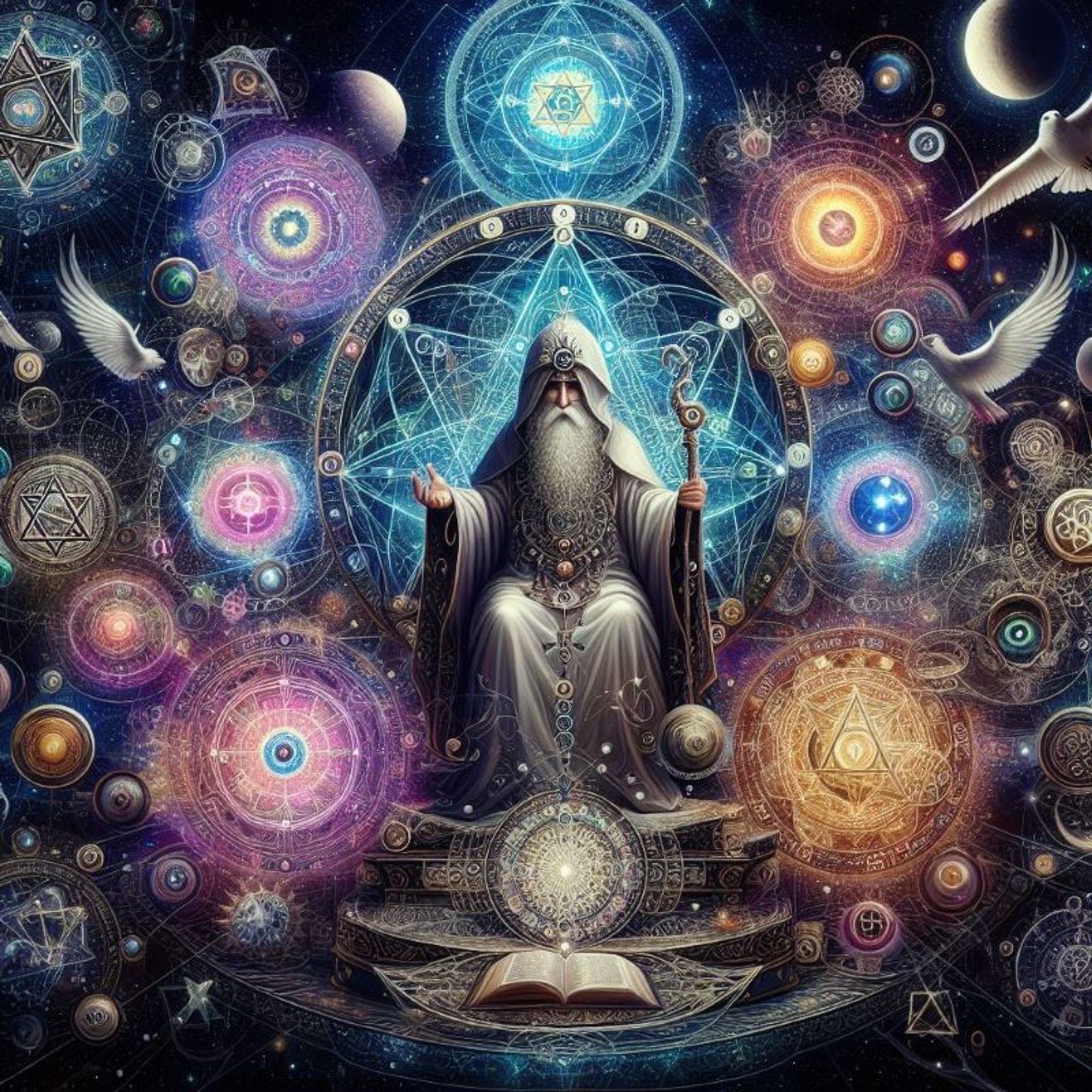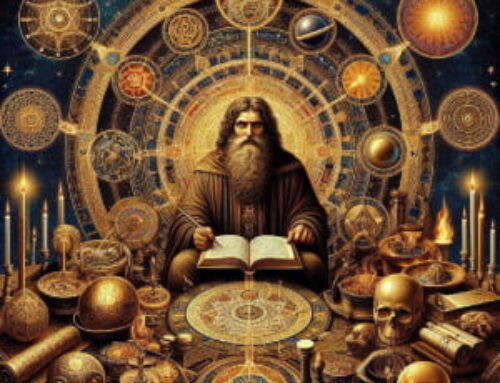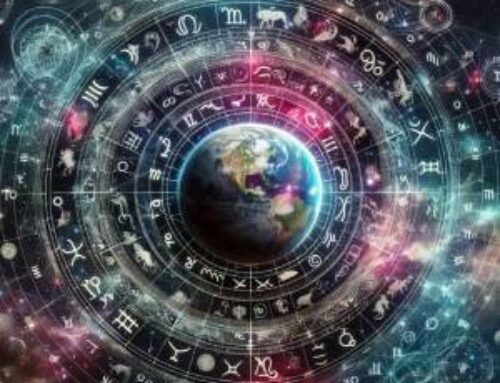Contents
- 1 Introduction
- 2 Foundations and History of Occult Orders
- 3 Principles and Teachings of Hermeticism
- 4 The Role of Rituals and Initiation in Occult Traditions
- 5 Alchemy as a Path to Enlightenment
- 6 Astrology’s Impact on Occult Philosophies
- 7 The Future of Occult Orders in Modern Spirituality
- 8 Conclusion
- 9 FAQ: Exploring the Mysteries of Occult Orders
- 10 References:
Introduction
Beneath the gaze of conventional chronicles and the veil that separates the mundane from the profound, lies the enigmatic sanctuary of the occult order. Shrouded in mystery and often misunderstood, this realm beckons seekers to unlock the secrets of the universe and their own dormant abilities. Anchored in venerable wisdom, the occult orders have steadfastly served as guardians of arcane lore, guiding neophytes through elaborate ceremonies, alchemical metamorphoses and celestial scholarship to spiritual enlightenment.

The term ‘occult’, derived from the Latin occultus, meaning ‘hidden’ or ‘secret’, perfectly encapsulates the essence of these teachings – hidden from the uninitiated, yet profoundly transformative for the intrepid soul who ventures into their depths. From the Hermetic Order of the Golden Dawn to the mystical rites of the Rosicrucians, each community offers a unique passage to decipher the cosmic ballet and our role in it.
In this odyssey, we traverse the cornerstones and annals of these cryptic orders, unravelling the cords of ancient wisdom that have woven the fabric of occult tradition. We explore the teachings of Hermeticism, the importance of ritual and initiation, the alchemical journey towards the philosopher’s stone, and the astral wisdom afforded by astrology – each a fundamental facet of the occult scheme for both personal and cosmic metamorphosis.
As we hover on the cusp of a new epoch, the relevance of the occult orders to contemporary spirituality becomes ever more apparent, urging us to expand our understanding and embrace the mysteries of the imperceptible. Through this pilgrimage, we invite both the inquisitive and the intrepid to uncover the hidden wisdom that has shaped humanity’s spiritual ascent, and to illuminate a path for those who dare to seek enlightenment in a world in perpetual flux.
Foundations and History of Occult Orders
The journey into the enigmatic world of occult orders takes us back to the cradle of civilization, where the seeds of esoteric wisdom were first sown. These orders, guardians of the arcane, have evolved through the ages, shaped by the hands of formidable figures and the tides of history. Their foundations are built upon the bedrock of ancient knowledge, a testament to humanity’s eternal quest for understanding the mysteries of existence.
Ancient Beginnings
The roots of occult orders stretch deep into antiquity, with whispers of their wisdom echoing through the corridors of Egyptian temples and the philosophical schools of Greece. These early societies understood that beyond the physical realm lies a deeper, spiritual dimension that could be accessed through ritual, meditation, and the study of nature’s hidden laws (1). It was this profound insight that laid the groundwork for the development of occult practices.
The Hermetic tradition
At the heart of the development of occult brotherhoods is the Hermetic tradition, named in honour of Hermes Trismegistus, an illustrious sage believed to have combined the wisdom of the Egyptian deity Thoth with that of the Hellenic Hermes. The Hermetic scriptures, especially the revered Corpus Hermeticum, enshrine the essential tenets of Hermeticism, emphasising the symbiosis of the cosmos and the ability of mortals to elevate themselves to godlike realms of consciousness through inner alchemy.
The Renaissance and Beyond
The Renaissance saw a convergence of occult and scientific mentalities, with a focus on natural signs and the interpretation of natural signs, influenced by various factors such as astrology, numerology, and alchemy (2).
The Renaissance marked a pivotal era for occult orders, as a renewed interest in ancient wisdom led to the flowering of alchemy, astrology, and Kabbalah in the West. Figures like Marsilio Ficino and Heinrich Cornelius Agrippa played key roles in reviving Hermetic philosophy, laying the groundwork for future orders. The establishment of the Rosicrucian Order and the later formation of the Hermetic Order of the Golden Dawn signified the culmination of centuries of esoteric tradition, blending mystical practices with philosophical inquiry.
The Modern Era
In the modern era, occult orders have continued to adapt, reflecting the changing landscape of spiritual seeking. While some remain closely guarded, others have opened their teachings to a wider audience, recognizing the universal hunger for deeper meaning in an increasingly materialistic world. Today, these orders stand as beacons for those on the path to self-discovery, offering ancient keys to unlock the mysteries of the self and the cosmos.
Principles and Teachings of Hermeticism
Hermeticism, a cornerstone of occult wisdom, offers a comprehensive understanding of the universe’s nature and the individual’s role within it. This ancient philosophy, encapsulating the teachings attributed to Hermes Trismegistus, serves as a fundamental guide for many occult orders, its principles echoing through the ages as a beacon of enlightenment and self-discovery.
The All is Mind
At the heart of Hermetic philosophy lies the principle that “The All is Mind.” This concept posits that the underlying reality of the universe is mental, and everything that exists is an expression of this cosmic consciousness. This understanding encourages the seeker to recognize their inherent connection to the divine mind and the power of thought to shape reality.
The Principle of Correspondence
“As above, so below; as below, so above.” This famous Hermetic axiom embodies the principle of correspondence, revealing the interconnectedness of the cosmos and the individual. It suggests that the patterns observed in the heavens are mirrored on Earth and within the human soul, offering a key to understanding the mysteries of existence through the study of nature’s harmonies and correspondences.
The Process of Alchemy
Alchemy, often associated with the transmutation of base metals into gold, is fundamentally a spiritual process in Hermeticism. It symbolizes the seeker’s journey of purification and transformation, aiming to refine the soul and achieve a state of divine enlightenment. This alchemical path involves the integration of opposites within the self, leading to wholeness and the realization of one’s true nature.
The Practice of Theurgy
Theurgy, or divine work, is another pivotal practice within Hermeticism, emphasizing the importance of rituals, invocations, and meditations to commune with the higher realms. Through theurgy, practitioners seek to align themselves with divine forces, facilitating spiritual growth and the manifestation of higher consciousness in the material world.
Embracing the Mystery of Life
Hermeticism teaches that the pursuit of wisdom is an eternal journey, inviting the seeker to embrace the mystery of life with an open heart and mind. It encourages an attitude of humble inquiry and the continuous exploration of the self and the universe, recognizing that true knowledge unfolds in the soul’s evolution towards unity with the All (3).
The Role of Rituals and Initiation in Occult Traditions
Rituals and initiation ceremonies stand as pivotal rites within the tapestry of occult practices, serving as gateways to deeper spiritual knowledge and transformation. These sacred processes, rich in symbolism and ancient wisdom, guide the initiate through the thresholds of consciousness, marking significant milestones on the path to enlightenment.
The Essence of Occult Rituals
Occult rituals are meticulously designed to align the microcosm of the individual with the macrocosm of the universe, creating a harmonious resonance between the practitioner and the higher realms. Through the use of symbols, chants, and ceremonial actions, rituals act as a powerful means to focus the will and intent, facilitating profound spiritual experiences and insights. They serve not only to honor the divine forces but also to enact the Hermetic principle of “as above, so below,” manifesting the spiritual within the physical.
The Process of Initiation
Initiation in occult orders is a sacred rite that symbolizes the seeker’s formal entry into the mysteries of the tradition. It represents a spiritual rebirth, wherein the initiate is transformed and begins anew on a path of self-discovery and divine communion. Through initiation, the individual is granted access to the order’s esoteric teachings and practices, embarking on a journey that challenges and expands their understanding of themselves and the universe.
Stages of Spiritual Development
Occult traditions often delineate a structured path of progression, with each stage of initiation corresponding to a deeper level of knowledge and spiritual attainment. These stages are designed to gradually prepare the initiate for the ultimate realization of their divine nature, ensuring that they are mentally, emotionally, and spiritually ready to embrace the profound truths of existence.
The Role of the Mentor
Within the context of initiation and ongoing spiritual development, the role of the mentor or guide is invaluable. This experienced practitioner provides support, guidance, and wisdom to the initiate, helping them navigate the challenges and revelations that accompany their spiritual journey. The mentor acts as a living bridge to the ancient wisdom of the order, embodying the principles and virtues that the initiate aspires to achieve.
Transformation Through Ritual and Initiation
The process of ritual and initiation in occult orders is transformative, leading the practitioner from the darkness of ignorance to the light of wisdom. It is a journey that requires courage, discipline, and a sincere desire for spiritual growth. Those who walk this path discover that the rituals and ceremonies are not mere formalities but vital tools for achieving harmony with the cosmos and awakening to their true potential.
Alchemy as a Path to Enlightenment
Alchemy, often shrouded in the mystique of turning lead into gold, holds a much deeper significance within the teachings of occult orders. This ancient art symbolizes the transformative journey of the soul, seeking not material wealth but spiritual enlightenment. Alchemy serves as a metaphorical blueprint for personal evolution, guiding seekers through the processes of dissolution, purification, and ultimately, rebirth.
The Spiritual Alchemy
At its heart, spiritual alchemy is the quest to transmute the base elements of human experience into the gold of divine wisdom. This path involves a series of stages, each representing different aspects of the human condition and the challenges inherent in transcending them. From the nigredo’s darkness, where old identities and beliefs are broken down, to the albedo’s purification and the rubedo’s enlightenment, alchemists navigate the inner landscapes of their being.
The Magnum Opus
The Great Work, or Magnum Opus, of alchemy is the process through which the individual achieves a state of perfect balance and unity with the All. This journey is marked by the mastery of the four elements—earth, air, fire, and water—and the integration of the masculine and feminine aspects of the self. Through this profound union, the alchemist awakens to the realization that the elixir of life, the philosopher’s stone, lies within.
Alchemy and Occult Orders
Within occult orders, alchemy is not merely a historical curiosity but a living tradition that informs practices and teachings. Initiates are encouraged to engage with alchemical symbolism and processes as tools for self-examination and spiritual growth. Through meditation, ritual, and the study of alchemical texts, seekers deepen their understanding of the universal principles at play in their own transformation.
The Role of Nature in Alchemy
Nature plays a crucial role in alchemical philosophy, seen as the external manifestation of the same principles that govern the internal world of the seeker. By studying the processes of nature—growth, decay, transformation—alchemists learn to align their own spiritual practices with the natural rhythms of the cosmos, facilitating their journey toward enlightenment.
Alchemy as a Living Art
In the modern context, alchemy remains a vital aspect of the spiritual path for many within occult orders. It is not just a metaphor but a lived experience, reflecting the ongoing quest for knowledge, balance, and connection with the divine. Alchemy teaches that enlightenment is not a distant, unattainable goal but a process of continual becoming, accessible to all who dare to embark on the journey.
Astrology’s Impact on Occult Philosophies
Astrology, a discipline as ancient as civilization itself, intricately weaves through the fabric of occult philosophies, offering a celestial compass for navigating the spiritual journey. Far beyond mere fortune-telling, astrology in the context of occult orders is revered as a sacred language—a means to decipher the divine plan inscribed in the stars and planets.
The Cosmic Blueprint
Astrology posits that the positions and movements of celestial bodies at the time of our birth are not coincidental but deeply meaningful. They provide a cosmic blueprint that can guide us through life’s challenges and opportunities. Occult philosophies embrace this cosmic interconnectedness, teaching that by understanding our astrological chart, we can align more closely with our destiny and the universal energies that influence our existence.
As Above, So Below
The Hermetic principle of “as above, so below” is vividly embodied in astrology, illustrating the mirroring of celestial patterns in our personal lives. Occult orders utilize this principle to emphasize the interconnectedness of the macrocosm (the universe) and the microcosm (the individual). This cosmic resonance underscores the belief that by studying the heavens, we gain insight into the workings of the human soul and the spiritual path that lies before us.
Astrology as a Tool for Enlightenment
Within occult traditions, astrology is not merely a predictive tool but a profound system for personal development and enlightenment. It offers a unique lens through which to view our strengths, weaknesses, and karmic challenges. By engaging with astrological wisdom, practitioners embark on a journey of self-discovery, uncovering the deeper spiritual lessons encoded in their life experiences and relationships.
The Role of Astrological Rituals
Occult orders often incorporate astrological rituals into their practices, harnessing the energies of specific planetary alignments for spiritual growth, healing, and manifestation. These rituals are carefully timed to coincide with auspicious celestial events, creating a powerful conduit for divine energy and facilitating a deeper connection with the cosmos.
Astrology and the Evolution of Consciousness
Astrology in the context of occult philosophies is not static but evolves with our expanding consciousness. As humanity’s understanding of the universe deepens, so too does our grasp of astrological wisdom. Occult orders view astrology as a living tradition, one that adapts to the shifting tides of human awareness while remaining rooted in ancient knowledge.
The Future of Occult Orders in Modern Spirituality
As the world undergoes rapid changes, both technologically and spiritually, the future of occult orders within the modern spiritual landscape presents a fascinating paradox. On one hand, these ancient paths seem worlds apart from the fast-paced, digitalized society we inhabit. On the other, there is a growing collective yearning for depth, meaning, and connection—qualities that occult orders have nurtured through millennia.
Adapting to a New Era
Occult orders are finding innovative ways to bridge the gap between age-old wisdom and contemporary spiritual seeking. The digital age has opened new avenues for dissemination and exploration of esoteric knowledge, making it accessible to a global audience. Online platforms, virtual gatherings, and digital archives are transforming how these ancient teachings are shared, studied, and practiced, ensuring their preservation and continuation.
The Quest for Authenticity
In a world saturated with information yet starved of genuine wisdom, occult orders offer a beacon of authenticity. They stand as custodians of profound spiritual truths, offering pathways that go beyond superficial practices. The modern seeker, disillusioned by the ephemeral and the superficial, is drawn to the depth, rigor, and transformational potential of occult practices. This quest for authenticity fuels the resurgence and relevance of these orders in contemporary spirituality.
Integration and Evolution
The future of occult orders lies not in isolation but in integration—engaging with the world while remaining true to their core principles. As society evolves, so too must these orders, adapting their teachings to address the spiritual and existential challenges of our time. This evolutionary approach ensures that occult wisdom remains a living, breathing tradition, capable of guiding individuals toward enlightenment and fulfillment in an ever-changing world.
The Challenge of Accessibility vs. Secrecy
A pivotal issue facing occult orders is balancing the need for openness with the preservation of sacred secrecy. While there is a movement towards greater transparency and inclusivity, the initiatory nature of these paths necessitates a degree of discretion. Navigating this delicate balance is crucial for maintaining the integrity and potency of the esoteric teachings while making them available to those sincerely seeking deeper spiritual engagement.
Shaping the Spiritual Landscape
Occult orders have the potential to significantly shape the spiritual landscape of the 21st century, offering sanctuary and guidance to those seeking to transcend the material and awaken to the spiritual dimensions of existence. By fostering a deeper understanding of the universe and our place within it, these orders play a vital role in the collective journey towards consciousness expansion and spiritual awakening.
Conclusion
As we traverse the expansive landscape of modern spirituality, the enduring legacy and evolving presence of occult orders stand as a testament to humanity’s unquenchable thirst for deeper understanding and connection. These ancient pathways, rich with centuries of wisdom, rituals, and transformative practices, offer not just a glimpse into the mystical traditions of the past but a living bridge to the spiritual possibilities of the present and future.
In an age where the ephemeral often overshadows the eternal, the teachings and practices of occult orders remind us of the profound depths of existence that lie beyond the surface of everyday life. They challenge us to look within, to question, to seek, and ultimately, to awaken to the truth of our divine nature and the interconnectedness of all that is.
An Invocation to the Spiritual Questers
As we linger at the juncture of the temporal and the everlasting, the summons of the occult fraternities echoes with greater clarity and insistence than before. This is a beckoning to those who dare to envision, to those in pursuit of enlightenment amidst the penumbra of the unknown, and to those desiring a profound, resonant communion with the enigma of their being.
The Hermetic Academy, as a lighthouse of hidden wisdom and spiritual counsel, welcomes you to an odyssey of exploration and metamorphosis. Within this sanctuary, amongst the hallowed lore of yore, you will discover a trail veering beyond the tangible realm, towards the sanctuaries of illumination and spiritual gratification.
We beseech you to embark upon this enlightening voyage. Let the wisdom of the occult fellowships steer you towards the awakening of your utmost capacity and the achievement of your spiritual endeavor.
FAQ: Exploring the Mysteries of Occult Orders
1. What is an occult order?
An occult order, maintained by the Hermetic Academy, is an organized group that studies and practices esoteric and mystical teachings. These orders are dedicated to exploring the deeper, hidden truths of the universe, engaging in initiation, rituals, and pursuing spiritual enlightenment.
2. How do I join an occult order?
Joining an occult order often involves a process of preparation and initiation, which can vary greatly between different groups. Typically, it requires a sincere interest in their teachings, a willingness to learn and grow spiritually, and sometimes an invitation or referral from an existing member.
3. Are occult practices safe?
Yes, occult practices are safe and transformative when approached within a mystery school such as the Hermetic Academy. It’s important to be trained in a reputable order.
4. Can studying occult philosophies improve my life?
The study of occult philosophies offers profound insights into the nature of reality and oneself, leading to personal growth, improved self-awareness, and a deeper sense of connection with the cosmos. These teachings can inspire positive changes in one’s life and outlook.
5. What’s the difference between Hermeticism and alchemy?
Hermeticism is a broad philosophical and spiritual tradition based on the teachings attributed to Hermes Trismegistus. Alchemy, while part of the Hermetic tradition, specifically focuses on the transformation of matter and spirit. Both share the goal of achieving enlightenment and understanding the mysteries of existence.
6. Is astrology a significant part of occult teachings?
Yes, astrology plays a significant role in many occult teachings, providing insights into the cosmic influences on human lives and the universe. It’s used as a tool for self-knowledge, spiritual growth, and understanding the interconnectedness of all things.
References:
(1) Martin, L. (2018). Initiation. The Oxford Handbook of Early Christian Ritual. https://doi.org/10.1163/1877-5888_rpp_dum_10411.
(2) Vickers, B. (1984). Occult and scientific mentalities in the Renaissance. The Eighteenth Century, 17, 113. https://doi.org/10.1017/CBO9780511572999.
(3) Rubenstein, E. (2024) The Hermetic Experience: From Mystery to Self-Knowledge. Hermetic World, Paphos.





